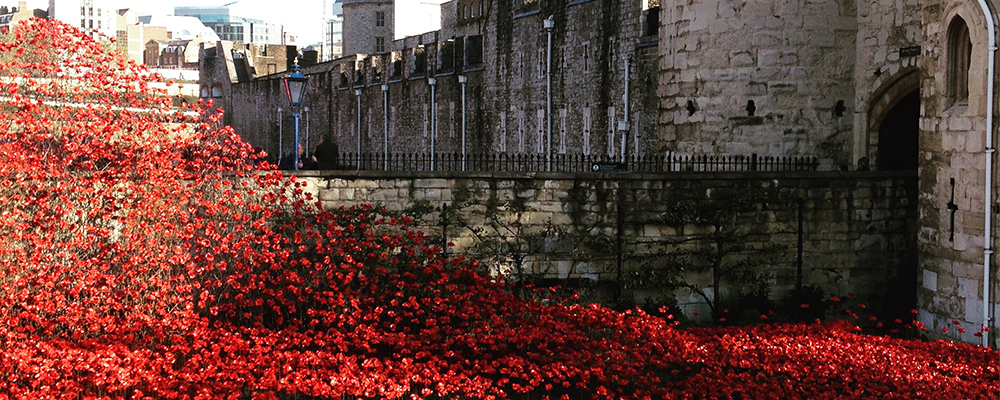LISTEN NOW
In Canada, we wear plastic poppies, purchasing another to replace the other one that fell off the one before. While we may long for a better poppy pin (“one that does not scratch your chin”, says my pal Lisa), we wear them with pride. They mark us, in our warm winter coats, as Canadians. We’re encouraged to Remember.
My Dad was 16 when he enlisted in the Royal Canadian Navy. Not even out of high school, and judging by the photo, barely even shaving. He was a kid with a crooked grin in search of an adventure. I imagine he, like most 16 year olds, was hemmed in by his hometown and anxious to start living and see the world!
Recruiters might not ask for actual ID during wartime. You could show up, claim to be 18 and away you went for basic training, emerging with a handsome uniform for photos and the more practical day to day kit, all stuffed into an actual duffel bag. Trading Grade 10 for adventure on the high seas, he shipped out from Halifax.
He never spoke about the war, even on Remembrance Day. We would return from school assembly, curious and a little bit frightened, and ask him about “what happened”. We knew something had, it was obvious, but there was no desire to open that box, let in a little air and perhaps, a little light.
Every family has something: divorce, drinking, mental illness. All families mess us up, somehow. It’s how we learn early lessons of resilience, self-reliance, what we do and do not want to become.
We were the children of a sensitive teenager with a thirst for adventure. Though, by the time we came along, he had hardened into a man haunted by things best kept at bay, numbed by alcohol and pain killers. Like I said, we all have something.
It wasn’t until I was in my late 20s and living in Ottawa that I even wanted to know more about his life in wartime, and was able to access his military record.
My father was a stoker who spent the war in the belly of a Corvette. These more agile war ships would escort destroyers across the treacherous and heaving Atlantic, for what would be the longest continuous battle of the Second World War. Living conditions were appalling, men stacked like timber in canvas hammocks, living below deck for weeks at a time. You can tour one the next time you are near Halifax Harbour. I took my mother there the year she turned 75. It was enlightening.
It’s no wonder he learned to drink in the Navy.
There were ports of call of course, travels etched permanently in ink on each forearm. My siblings and I were fascinated by these skin paintings: a huge wooden ship, sails a flutter on one arm, and a heavy anchor on the other. We didn’t know anyone else whose father had tattoos, it made him seem exotic, different, Poppa Popeye.
And he was a fighter. It showed up on his war record, several times. He wasn’t tall, but he was opinionated. He was smart, devouring a stack of books a week and hammering us with new words and ideas. That he was intelligent there was no doubt, but there was a chip on his shoulders too. He was once famously described as “the most instantly dislikable person I have ever met” by our family lawyer.
He did not suffer fools, and could be a nightmare at parent teacher interviews. He loved us fiercely, although we wouldn’t be able to translate “fierce” to “love” for many years.
My mother still has his original Royal Canadian Navy ID, typed incredibly on canvas, designed to survive soaking at sea. There’s also one photo where he stands shiny and heartbreakingly sweet in his dress uniform, smiling at the camera. It’s the photo they send home to worried mothers: aching innocence, uncertainty, hope.
I wonder sometimes what life would have been like if he had not enlisted, this small, sensitive man on the road not taken?
War broke my father, cracked him open and he never quite healed. We’ll never know who started what fight, or why. What it takes to live stacked into canvas envelopes on a gunmetal grey sea. Days spent in the dark, shoveling coal, rare ports of call where you drank hard and inked yourself, proof you could survive. You were there.
There were moments; tender hugs or lively conversation about politics or points of grammar… surprising acts of kindness that would confuse us. A sort of emotional cease fire, where we could spend a minute, an hour, sometimes a day, glimpsing the soul of our broken, tenderhearted father.
My brother and sisters and I were tempered by this maddening and mercurial man. Did we love him? Yes, although we never would have said that then. He died when I was 18, body finally giving out after a lifetime of trying to escape it.
How many other fathers? Mothers? Aunts or Uncles? How many other children, grand children, brothers and sisters? And how many stories will be shared on Remembrance Day?
I can tell you that understanding and empathy can mature into a deep love. A fierce love.
Pride and gratitude.


Lovely story Kerrie, while gentling the real living of it. Helpful for all those of us who had Dads who shipped out from Halifax and returned with no stories of war that they could speak of.